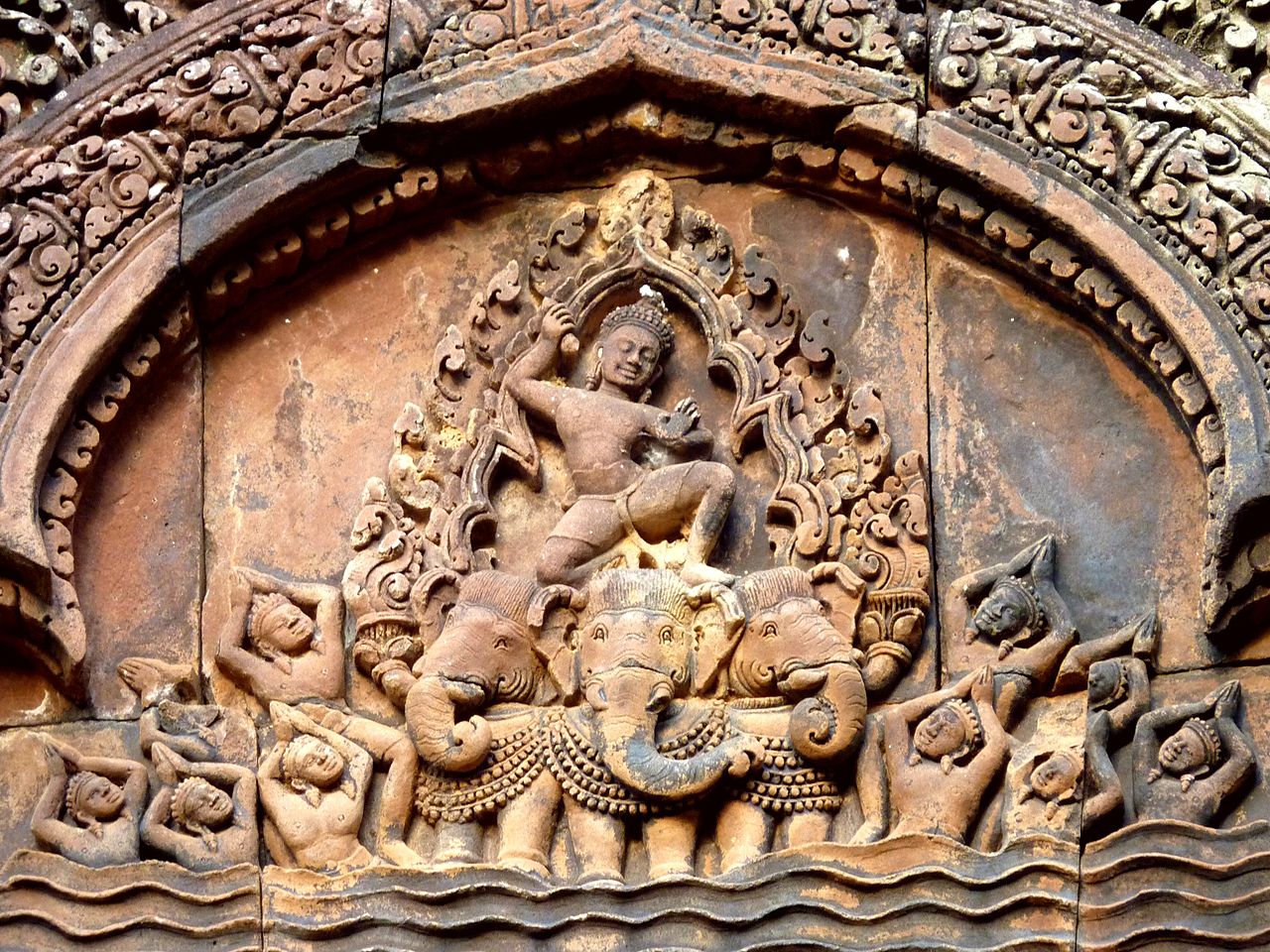
Sometime between 1700 and 1100 B.C.E., four massive books, written in Sanskrit, were codified to create the Vedas.
These included groupings of various myths, rituals, prayers and a philosophical system (Vedanta/Advaita) that posits that the Personal Soul (Atman) and the Universal Soul (Brahman) are one and the same.
Despite this, the Vedas still had a pantheon, headed by the Storm God Indra.
While the Vedas would coexist and inform the development of modern Hinduism, the Vedic Gods didn’t fare so well.
The once mighty Indra was reduced to a drunken nuisance in post-Vedic literature, throwing atmospheric temper tantrums and interfering with meditating ascetics.
He was a shell of a God…
And then the Buddhists got ahold of him…
*
Buddhism, even in its most theological forms (Mahayana/Vajrayana), doesn’t grant immortality to the Gods.
Indra is still around, often called Sakra; while he rules over the highest of the so-called ‘desire realms’, Deva-loka, his rule is finite. This notion is played out in the following tale, which while originally from the Hindu Brahmavaivarta Purana, fits right in with Buddhist sensibilities.
*
What is the real mark of a hero?
Slaying the Dragon, the Primordial Sea Dweller.
Marduk (also a Storm God) vs. Tiamat…
So it was that the Indra slew the massive beast known as Vritra, and he felt pretty good about it.
After reclaiming the Heavens, everything looked so small.
Even his own palace seemed…tiny…
Issue solved: he called for Vishwakarma, the divine architect.
Vishwaakarma listened patiently as Indra described his plans…which were essentially Bigger, Shinier, Manlier.
Vishwakarma went to work. For a year he toiled ceaselessly, building a celestial mansion that filled the heavens.
He showed his masterpiece to the Storm God.
Indra wasn’t impressed.
*
Vishwakarma went back to work…The second palace redesign fared no better than the first. Indra wanted more.
Third times a charm, right?
Not for Vishwakarma .Once again Indra rejected the palace.
In desperation, Vishwakarma went to Brahma, the creator of the universe…
*
The next day, as Indra was strolling through the garden, he met a dark skinned boy who was looking at the palace in awe.
“Do you like it?” the Storm God asked the child.
“It’s still a work in progress, but I have all the time in the world.” Indra continued.
Vishwakarma was passing by; Indra waved him over and patted him on the back.
“All the time in the world, right Vishwakarma?” Indra smiled.
Vishwakarma quietly sighed. And then the boy spoke:
“Of all the palaces built by all the Indras before you, this is by far the finest.”
“Kid, there’s only one Indra, OK? I’m right here.”
Just then, a row of ants started marching on Indra’s palace, prompting the boy to giggle.
“Lord Indra, how much time is all the time in the world?”
Indra was silent. Nothing about this felt right…
The child answered his won question:
“The universe wakes up with Brahma. The universe sleeps with Brahma. In between there are 4.32 billion years of Gods and Demons, Indras and Vritas.”
Indra remained silent as the ants continued their march.
The boy proceeded:
“The funny thing is, you always win. And you always spend the rest of your days chasing a perfect palace. And this one,” he waved his arm across the horizon “is the best work you’ve ever done. Well done, latest Indra. Not to forget your architect, the latest Vishwamitra.”
He then pointed to the ants.
“You’ve done better than your predecessors. Someday, you’ll make a great ant King, in a great ant Palace.”
The boy, black as night, walked away cheerfully, and the ants marched on.
*
What’s the take-away?
Perhaps it can be found in Percy Bysshe Shelley’s Ozymandias:
I met a traveller from an antique land,Who said—“Two vast and trunkless legs of stoneStand in the desert. . . . Near them, on the sand,Half sunk a shattered visage lies, whose frown,And wrinkled lip, and sneer of cold command,Tell that its sculptor well those passions readWhich yet survive, stamped on these lifeless things,The hand that mocked them, and the heart that fed;And on the pedestal, these words appear:My name is Ozymandias, King of Kings;Look on my Works, ye Mighty, and despair!Nothing beside remains. Round the decayOf that colossal Wreck, boundless and bareThe lone and level sands stretch far away.






More Stories
Interview with Jason Aaron (Thor: God of Thunder), Part One
“And All the Generous Earth”: Ásatrú Ritual and Climate Change Ethics, Part Two
“And All the Generous Earth”: Ásatrú Ritual and Climate Change Ethics, Part One